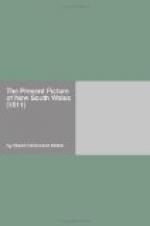Governor Phillip sailed to England on the 11th of December, 1792, when Lieutenant-Governor Grose succeeded to the government; and, during his period, the improvements in the settlement assumed a more decisive and favourable aspect. The settlers were now enabled to sell corn to the public stores, all of which the commissary received directions to purchase at a given price: passage-boats were licensed and established between the towns of Sydney and Parramatta, and the number of settlers began to increase in a rapid portion. On the 15th of December, 1794, Lieutenant-Governor Grose left the colony for England, and Captain Paterson, of the New South Wales corps, assumed the government until the arrival of Governor Hunter, who came out in the Reliance, on the 7th of September, 1795, and entered upon the functions of his important office without delay.
One of the first acts of the new governor was the establishment of a printing-press, the advantages of which soon became obvious, in the more ready communication of all orders for the regulation of the settlement.
The bulls and cows which had been originally brought over to the new continent had, by the carelessness of their keeper, been suffered to stray into the woods, and every subsequent search after them had proved ineffectual until this period, when a fine and numerous herd of wild cattle was discovered in the interior of the country, which was evidently the progeny of the animals which had been so long lost to the colony. The protection of this wild herd and its increase became a matter of public interest, since it would, hereafter, serve as a valuable resource, in case of necessity; and measures were accordingly adopted to prevent any encroachment on that liberty which it had preserved above seven years.




